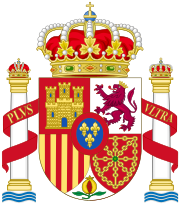Constitutional Court of Spain
| Constitutional Court | |
|---|---|
| Tribunal Constitucional | |
 | |
 Headquarters of the Constitutional Court | |
 | |
| Established | 1978 |
| Jurisdiction | Spain |
| Location | Madrid |
| Composition method | Appointed by theKingafter being nominated by theParliament,theGeneral Council of the Judiciaryand theGovernment. |
| Authorized by | Spanish Constitution |
| Judge term length | 9 years, non renewable |
| Number of positions | 12 |
| Annual budget | €28.42 million (2022)[1] |
| Website | www.tribunalconstitucional.es |
| President | |
| Currently | Cándido Conde-Pumpido |
| Since | 12 January 2023 |
| Vice President | |
| Currently | Inmaculada Montalbán Huertas |
| Since | 12 January 2023 |
 |
|---|
TheConstitutional Court(Spanish:Tribunal Constitucional)[n. 1]is thesupreme interpreterof theSpanish Constitution,with the power to determine the constitutionality of acts and statutes made by any public body, central, regional, or local in Spain. It is defined in Part IX[2](sections 159 through 165) of the Constitution of Spain, and further governed byOrganic Laws2/1979 (Law of the Constitutional Court of 3 October 1979),[3]8/1984, 4/1985, 6/1988, 7/1999 and 1/2000.[4]The court is the "supreme interpreter"[4]of the Constitution, but since the court is not a part of theSpanish Judiciary,[4]theSupreme Courtis the highest court for all judicial matters.[5]
Powers[edit]
The Constitutional Court is authorized to rule on theconstitutionalityof laws, acts, or regulations set forth by the national or the regional parliaments.[6]It also may rule on the constitutionality ofinternational treatiesbefore they are ratified, if requested to do so by the Government, theCongress of Deputies,or theSenate.[6]The Constitution further declares that individual citizens mayappealto the Constitutional Court for protection against governmental acts that violate their "fundamental rights or freedoms".[3][6]Only individuals directly affected can make this appeal, called arecurso de amparo,and they can do this only after exhausting judicial appeals.[6]Public officials, specifically "thePresident of the Government,the Defender of the People, fifty Members of Congress, fifty Senators, the Executive body of anAutonomous Communityand, where applicable, its Assembly ",[7]may also request that the court determine the constitutionality of a law. The General Electoral Law of June 1985 additionally allows appeals to this court in cases where electoral boards exclude candidates from the ballot.[3]
In addition, this court has the power to preview the constitutionality of texts delineating statutes of autonomy and to settle conflicts ofjurisdictionbetween the central and the autonomous community governments, or between the governments of two or more autonomous communities.[6]Because many of the constitutional provisions pertaining to autonomy questions are ambiguous and sometimes contradictory, this court could play a critical role in Spain's political and social development.[6]The decisions of the Constitutional Court cannot be appealed by anyone.[3][8]
Composition[edit]
This court consists of twelve justices (Spanish:magistrados) who serve for nine-year terms. Four of these are nominated by theCongress of Deputies,four by theSenate,two by the executive branch of the government, and two by theGeneral Council of the Judiciary;[6]all are formally appointed by theKing.[3]The Constitution sets a minimum standard of fifteen years of experience in fields related to jurisprudence, including "magistrates and prosecutors, university professors, public officials and lawyers,"[9]and must not contemporaneously hold a position that may detract from their independence, such as a post in a political party or a representative position.[10]
Amongst and by the justices of the Court, aPresidentis elected for a three-year term, who is assisted by a Vice President, who is also justice, and a secretary-general, that is the responsible for overseeing the staff of the court.[3]
Composition[edit]
The Constitutional Court consists of a president, currentlyCándido Conde-Pumpido,the vice president, currently Inmaculada Montalbán Huertas and ten justices (whom can be judges or jurists with relevant experience).
Emeritus Justices[edit]
Any previously appointed justice of the Constitutional Court becomes an emeritus justice (Spanish:magistrados eméritos) after their term of office.
Notable decisions[edit]
In 2005, the court ruled that theSpanish judicial systemcould handle cases concerningcrimes against humanity,such asgenocide,regardless of whether Spanish citizens were involved or directly affected.[11]In this instance, it reversed the decision made by the Supreme Court in the same case, which held that such cases could be brought before Spanish courts only if a Spanish victim was involved.[12]
In 2005, a challenge before the Court was presented denouncing the Same-sex Marriage Act of 2005 arguing that the Constitution says that «men and women have the right to marry with full legal equality» and this did not allow same-sex marriages. In 2012, after seven years of study, the Court rule that the Constitution allowssame-sex marriagesbecause the social concept of marriage had evolved so the Constitution must to be interpreted according to the current cultural values.[13][14]
A controversial decision in 2010 declaring unconstitutional few articles of theStatute of Autonomy of Cataloniahas been a source of much controversy and conflict since then, with some arguing that the judgement was illegitimate due to the removal of a judge and three more judges having their terms expired.[15]
In 2017, the court ordered those responsible for the referendum on November 9, 2014 to pay 5 million euros.[16]In addition, social agents from Spain have demanded that the distribution of public funds in the Catalan press should be audited.[17]
In 2022, the court blocked draft legislation which would have made changes to theGeneral Council of the Judiciary.[18]The move to prevent the legislation was condemned by Prime MinisterPedro Sánchez,who said he would use "whatever means necessary" to resolve the crisis.[19]
See also[edit]
Notes[edit]
- ^Spanish pronunciation:[tɾiβuˈnalkonstituθjoˈnal]
References[edit]
- ^"Constitutional Court Budget for 2022"(PDF).
- ^wikisource:Spanish Constitution of 1978/Part IX.
- ^abcdefNewton, Michael T.; Peter J. Donaghy (1997).Institutions of modern Spain: a political and economic guide.Cambridge University Press.ISBN0-521-57348-3.
- ^abcOlga Cabrero."A Guide to the Spanish Legal System".Law Library Resource Xchange,LLC. Archived fromthe originalon April 21, 2016.RetrievedDecember 8,2006.
{{cite journal}}:Cite journal requires|journal=(help) - ^§ 123, clause 1, Spanish Constitution of 1978.
- ^abcdefgBrowning Seeley, Jo Ann (1990). "The Judiciary". In Solsten, Eric; Meditz, Sandra W. (eds.).Spain: a country study.Washington, D.C.:Federal Research Division,Library of Congress.p. 221.OCLC44200005.
 This article incorporates text from this source, which is in thepublic domain.
This article incorporates text from this source, which is in thepublic domain.
- ^§ 162, clause 1a, Spanish Constitution of 1978
- ^§ 164, clause 1, Spanish Constitution of 1978
- ^§ 159, clause 2, Spanish Constitution of 1978
- ^§ 159, clauses 4 and 5, Spanish Constitution of 1978
- ^"Guatemalan court to rule soon on Spanish request for arrest of ex-dictator".International Herald Tribune.December 6, 2006.
- ^"Constitutional Court of Spain rules that its courts may hear genocide cases even if they do not involve Spanish citizens, and holds that principle of universal jurisdiction takes precedence over alleged national interests".International Law Update.11(10). October 2005.
- ^"I·CONnect – The Spanish Constitutional Tribunal's Same-Sex Marriage Decision".www.iconnectblog.com.RetrievedOctober 26,2018.
- ^"Spain Constitutional Court rejects same-sex marriage challenge".www.jurist.org.RetrievedOctober 26,2018.
- ^"Claves de la renovación del Tribunal Constitucional"[The Keys to the Renewal of the Constitutional Court].El Mundo(in Spanish). May 27, 2010.
- ^"Spanish auditors demand Catalan leaders pay for previous independence vote".Reuters.September 5, 2017.
- ^"181 millones para los medios en pleno proceso soberanista".El Mundo.September 8, 2014.
- ^Jones, Sam (December 20, 2022)."Spanish PM vows to end 'unjustifiable' block on court changes".the Guardian.Guardian.
- ^Cué, Carlos E. (December 20, 2022)."Pedro Sánchez pide" serenidad "y garantiza que resolverán el bloqueo del Constitucional y el Poder Judicial".El País(in Spanish).






